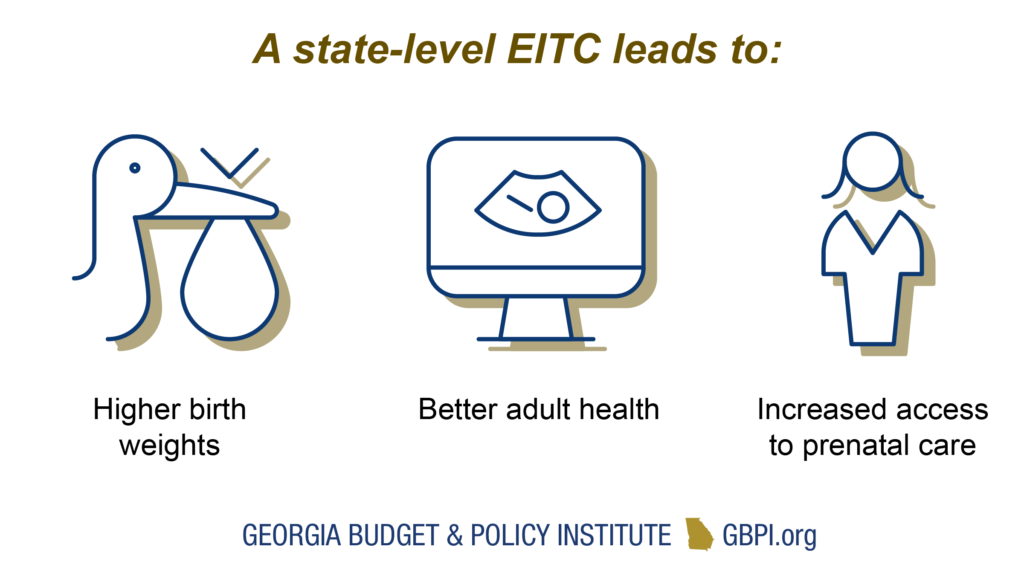Georgia has the potential to be a great place to live and raise a family, but right now we are falling short on that promise. Our schools are underfunded, our workers lack critical protections, and too many Georgians cannot access adequate health care. In fact, Georgia ranks No. 46 out of all states for children’s health—and the rate of babies born with low birthweight has risen in the past few years.
Low birthweight—defined as a birth weight lower than five pounds, eight ounces—can affect health outcomes throughout a child’s life. According to The Annie E. Casey Foundation’s 2020 Kids Count data, 9.7 percent of Georgia babies were born with low birthweights in 2010. Now, the rate is 10.1 percent, compared to the national average of 8.3 percent. This high rate can have lifelong effects: Babies with low birthweights are more likely to suffer other health problems like chronic lung disorders or heart conditions. Low birthweight is also a leading cause of infant mortality. Georgia has the seventh-highest rate of infant mortality in the country and ranks No. 4 in low birthweight.
A variety of factors cause low birthweight, including premature birth and the mother’s health. Children born during a multiple birth—that is, twins, triplets, etc.—are also more likely to be born premature and with low birthweight.
Whatever specific factors lead to an individual baby’s low birthweight, the root causes of the issue in Georgia stem from a lack of health care access and high poverty rates, which lead to inadequate pregnancy nutrition and prenatal care, as well as pregnancy complications. These factors also explain why Black mothers are more than twice as likely as white mothers to give birth to infants with low birthweights. This disparity stems from systemic racism, a collection of discriminatory practices and racial biases that reach into nearly every facet of life, including birthweight determinants like income and health care access.
Boosting health outcomes in our state can improve birthweights and help address the problems created by systemic racism. Some solutions are obvious: Full Medicaid expansion to all families eligible under federal law, for example, will help pregnant Georgians access the care they need. Adequately funding all aspects of health, including public health programs to prevent chronic disease or substance use treatment, would also improve birthweights in Georgia. But there is another tool available that would provide real health benefits to families with low or moderate incomes: a state-level earned income tax credit (EITC).
An EITC helps reduce the amount of income tax owed by families with low or moderate incomes. The federal government has one, and thirty states and the District of Columbia build on the federal EITC’s success with their own state-level versions of the tax credit. Up to 3 million Georgians and 1.5 million children could benefit from a state-level EITC. The credit would deliver the largest value to families making from about $10,000 to $38,000 a year, though families making up to the median household income, about $56,000 per year, can be eligible depending on specific circumstances like number of children.

The EITC is a powerful, targeted tool for health equity. Poverty can lead to a lack of resources important to health, such as access to health care, healthy foods and stable housing. But an EITC helps families afford these necessities, leading to better health outcomes. For example, parents who receive the credit have fewer markers of high blood pressure, high cholesterol and inflammation. Larger state EITC benefits also improve the likelihood that parents birth can receive prenatal care—and the benefits are particularly clear for Black parents and parents with fewer years of education.
In turn, studies find that babies born in states with EITCs have higher birthweights. This is particularly true in states with a refundable credit where families receive the full value of the credit they qualify for, even if they earn too little to receive the credit in the form of an income tax reduction. If Georgia enacted an EITC at 10 percent of the federal credit, Georgia could see 1,047 fewer low-weight births each year.
There is bipartisan momentum behind a state-level earned income tax credit, called the Georgia Work Credit. Bipartisan legislation was introduced during the 2019-2020 Legislative Session. COVID-19 has served to underscore the need for anti-poverty measures and improved access to health care, as well as the need for more policies that address systemic racism. A Georgia Work Credit can help our state accomplish those goals.
To learn more, visit GeorgiaWorkCredit.org.








